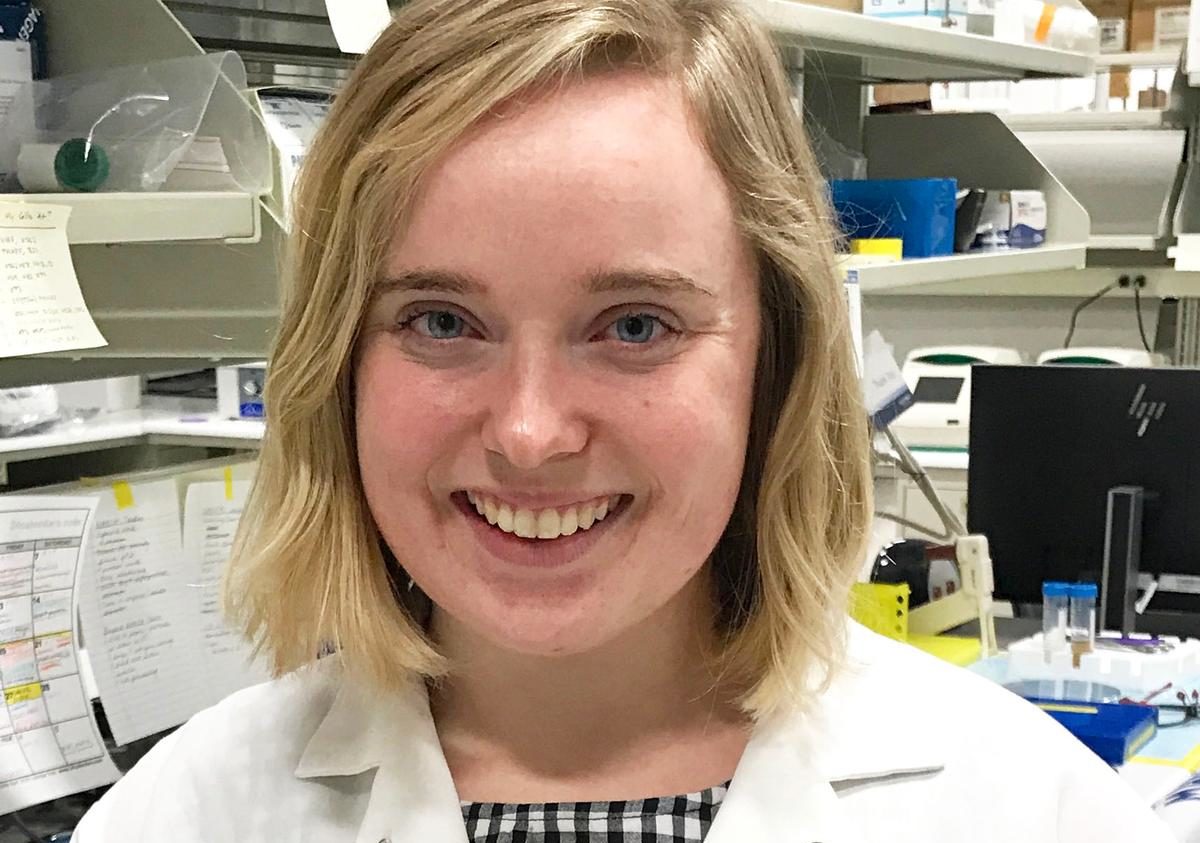Graduate school. It’s a big decision significantly impacting a person’s personal life and career. And even while finishing her undergraduate education, Hannah Wollenzien knew she wanted to pursue research. When she began looking at graduate programs, she had a clear idea of what she wanted and was happy to find the right program at Sanford Research.
Deciding her focus
Wollenzien was no stranger to research. Before graduating from Concordia College in Moorhead, Minnesota, she had already completed multiple internships, including two summers studying Alzheimer’s disease at the University of North Dakota, one summer studying diabetes at North Dakota State University and a nursing program for Mayo Innovation Scholars Program studying prostate cancer.
As Wollenzien decided what her future would hold, she knew she was looking to study cancer and genetics. More importantly, she wanted to go to an institution committed to translational research.
“My mom is an oncology nurse, so I have a family background in cancer care,” Wollenzien explains. “I applied to multiple graduate programs, and my main motivation was finding a program that had clinical relevance. It was really important to me to be learning from people who were dedicated to getting research back to the patient.”
Touring the research space
Lance Lee, Ph.D., director of higher education at Sanford Research, invited Wollenzien to come in for an interview and tour the Sanford Research facility.
“Sanford fit all the criteria I was looking for,” Wollenzien says. “The research space was incredible. I liked that everything was open. Honestly, I was sold after seeing that shared space, the collaboration that occurred and all of the amazing technology available.”
While she was at the facility, Dr. Lee also invited her to meet with various faculty, and she met as many of the cancer researchers as she was able to.
“We talked about their interests, their focus and the trajectory of their research, which really helped me understand what I would be doing if I was a graduate student in that lab,” Wollenzien says. “After that, I knew Sanford Research was the right place for me.”
Feeling supported
When Wollenzien transitioned to graduate school, she was concerned she would lose the support she had been accustomed to at a liberal arts college. She then discovered she was fully prepared for that challenge — and more importantly, would receive just as much support as she had previously.
“Concordia did a fantastic job preparing me for graduate school. I thought it would be an adjustment, but I have felt equally supported in my graduate program,” Wollenzien says. “Sanford faculty are very receptive to graduate students, and they are supportive in both education and
research. They want you to succeed academically but also want you to feel passionate about research.”
Passion truly shines
Of everything Sanford Research offers — a state-of-the-art facility and laboratories, the newest technology and expertise in vast disciplines — Wollenzien says it is the passion the staff have that truly shines.
“Obviously, education is important, but the faculty come to work every day to research. You can tell they are really passionate. It is not their side thing that they work on. This is their actual focus and the thing they love to do,” she says.
While completing her first year, Wollenzien felt that same passion. The program allowed her to rotate between three laboratories that first year before determining the laboratory she would work with more permanently.
“You don’t know if you are going to fit well until you are in the laboratory. It can look great on paper, but then it doesn’t quite fit,” Wollenzien says. “So the opportunity to rotate that first year is really beneficial. I had my own project in each laboratory, and I got to study three very different and distinct areas of research within cancer.”
She continues to split her time between the laboratory at Sanford Research and her educational requirements at University of South Dakota. Though she has already developed extensive experience within a short time, her research journey is just starting and full of possibility.
More stories
- Top grants help Sanford Research draw undergrad interns
- Freel finds her career niche with help from Sanford Research
- Anderson able to pursue two careers with Sanford Research
…
Posted In Cancer, Genetics, Health Information, Postgraduate Programs, Research, Sanford Stories
